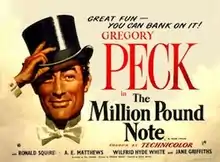The Million Pound Note
The Million Pound Note is a 1954 British comedy film directed by Ronald Neame and starring Gregory Peck, Ronald Squire, Wilfrid Hyde-White and Jane Griffiths. It is based on the 1893 Mark Twain short story The Million Pound Bank Note, and is a precursor to the 1983 film Trading Places.[1] It was shot at Pinewood Studios and on location around London. The film's sets were designed by the art directors John Box and Jack Maxsted. It was released by Rank's General Film Distributors. The American release was handled by United Artists under the alternative tile Man with a Million.
| The Million Pound Note | |
|---|---|
 British theatrical poster | |
| Directed by | Ronald Neame |
| Screenplay by | Jill Craigie |
| Based on | The Million Pound Bank Note by Mark Twain |
| Produced by | John Bryan Earl St. John Ronald Neame |
| Starring | Gregory Peck Ronald Squire Wilfrid Hyde-White Jane Griffiths |
| Cinematography | Geoffrey Unsworth |
| Edited by | Clive Donner |
| Music by | William Alwyn |
Production company | |
| Distributed by | General Film Distributors |
Release date | 7 January 1954 |
Running time | 90 minutes |
| Country | United Kingdom |
| Language | English |
Plot
In 1903, American seaman Henry Adams is stranded penniless in Britain and gets caught up in an unusual wager between two wealthy, eccentric brothers, Oliver and Roderick Montpelier. They persuade the Bank of England to issue a one million pound banknote, which they present to Adams in an envelope, only telling him that it contains some money. Oliver asserts that the mere existence of the note will enable the possessor to obtain whatever he needs, while Roderick insists that it would have to be spent for it to be of any use.
Once Adams gets over the shock of discovering how much the note is worth, he tries to return it to the brothers, but is told that they have left for a month. He then finds a letter in the envelope, explaining the wager and promising him a job if he can avoid spending the note for the month.
At first, everything goes as Oliver had predicted. Adams is mistaken for an eccentric millionaire and has no trouble getting food, clothes, and a hotel suite on credit, just by showing his note. The story of the note is reported in the newspapers. Adams is welcomed into exclusive social circles, meeting the American ambassador and English aristocracy. He becomes very friendly with Portia Lansdowne, the niece of the Duchess of Cromarty. Then fellow American Lloyd Hastings asks him to back a business venture. Hastings tells Adams that he does not have to put up any money himself; the mere association will allow Hastings to raise the money that he needs to develop his gold mine by selling shares.
Trouble arises when the Duke of Frognal, who had been unceremoniously evicted from the suite Adams now occupies, hides the note as a joke. When Adams is unable to produce the note, panic breaks out amongst the shareholders and Adams's creditors. All is straightened out in the end, and Adams is able to return the note to the Montpelier brothers at the end of the month.
Cast
- Gregory Peck as Henry Adams
- Ronald Squire as Oliver Montpelier
- Wilfrid Hyde-White as Roderick Montpelier
- Jane Griffiths as Portia Lansdowne
- Joyce Grenfell as Duchess of Cromarty
- A. E. Matthews as Duke of Frognal
- Maurice Denham as Mr. Reid
- Reginald Beckwith as Rock
- Brian Oulton as Lloyd
- John Slater as Parsons
- Wilbur Evans as American ambassador
- Hartley Power as Hastings
- George Devine as restaurant proprietor
- Bryan Forbes as Todd
- Gudrun Ure as Renie
- Hugh Wakefield as Duke of Cromarty
- Ronald Adam a Samuel Clemens
- Felix Felton as Alfred
- Richard Caldicot as James, the Butler
- Hugh Griffith as Potter
- Ann Lancaster as Doris
- Laurence Naismith as Walter Craddock
- Gibb McLaughlin as Sir William Collinge
- Ernest Thesiger as Mr. Garrett
- Percy Marmont as Lord Hurlingham
- Joan Hickson as Maggie
- Harold Goodwin as Horace
- Henryetta Edwards as Lady Jane
- Winifred Evans as Lady Hurlingham
- Jack McNaughton as Williams
- Hal Osmond as Arthur
- Mae Bacon as Alfred's Wife
- Peggy Ann Clifford as Assistant Matron
- Fanny Carby as Nursemaid at Belgrave Square
- Eliot Makeham as Consulate Official
- Hugh Latimer as Hotel Receptionist
- Roddy Hughes as Clergyman
- Totti Truman Taylor as Singer
- Leonard Sharp as Cabbie
- Willoughby Goddard as Stockbroker
Production
The novel had been adapted for British TV in 1950 by Rex Rienits. Producer Daniel Angel bought the film rights to the adaptation.[2]
Reception
In the 21st century, Hal Erickson described it as "satisfying", with humor that makes the audience's laughter cascade.[3]
References
- Drumm, Diana (8 June 2013). "'Trading Places': More Than 7 Things You May Not Know About The Film (But We Won't Bet A Dollar On It)". Indiewire. Retrieved 25 December 2016.
- "Studio Gossip". The Sunday Herald. Sydney. 19 August 1951. p. 12. Retrieved 6 June 2015 – via National Library of Australia.
- "The Million Pound Note (1954) - Ronald Neame | Synopsis, Characteristics, Moods, Themes and Related". AllMovie.